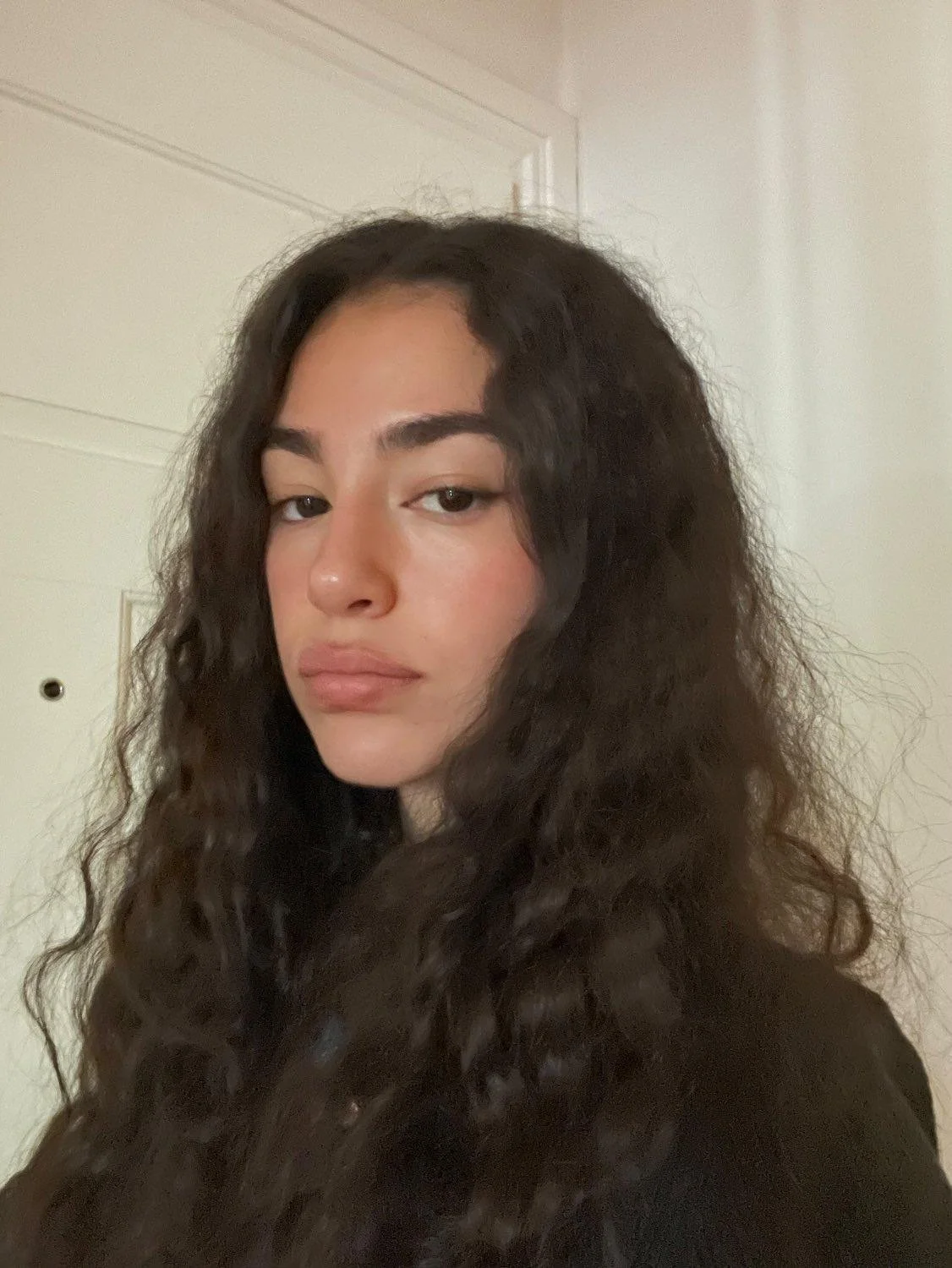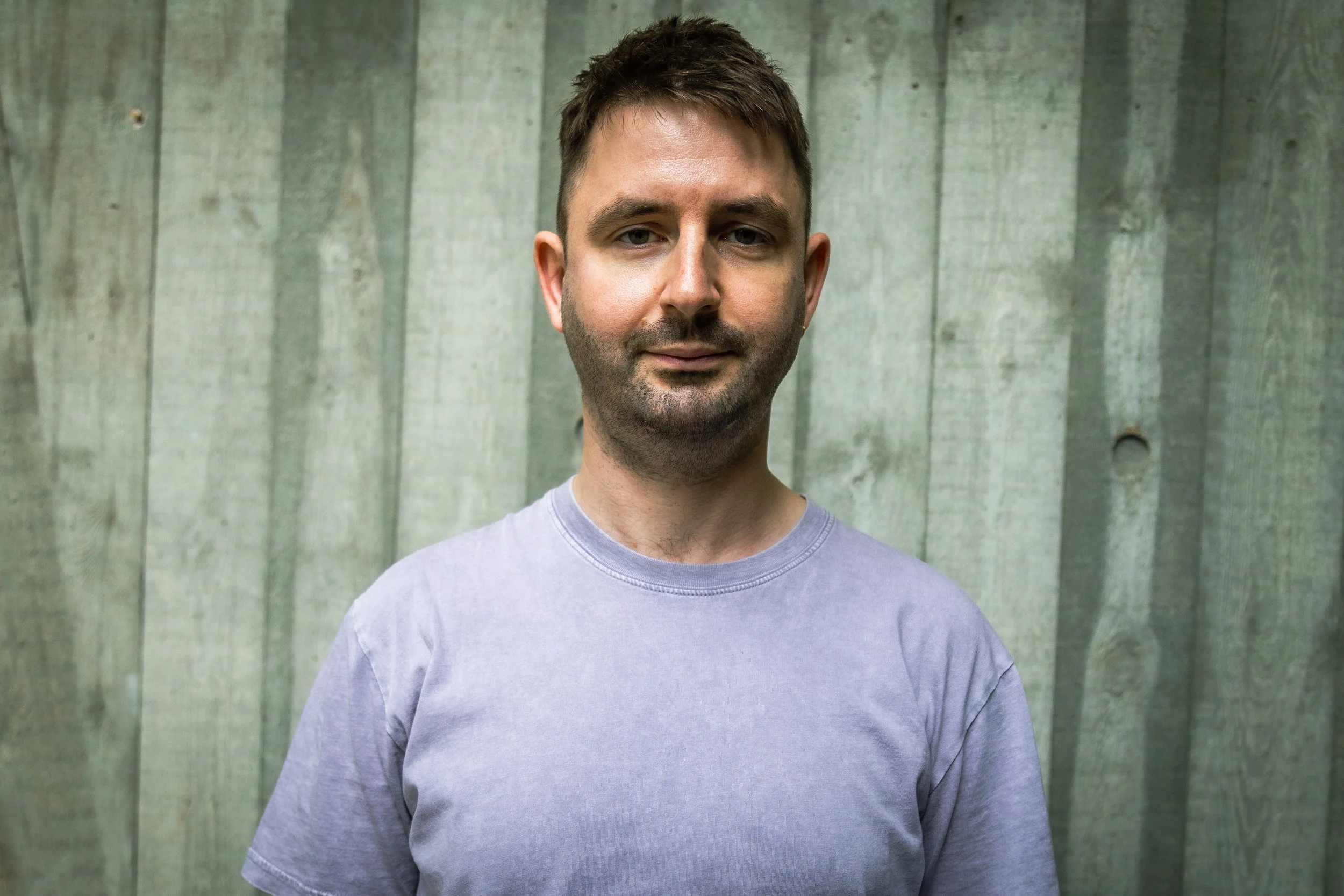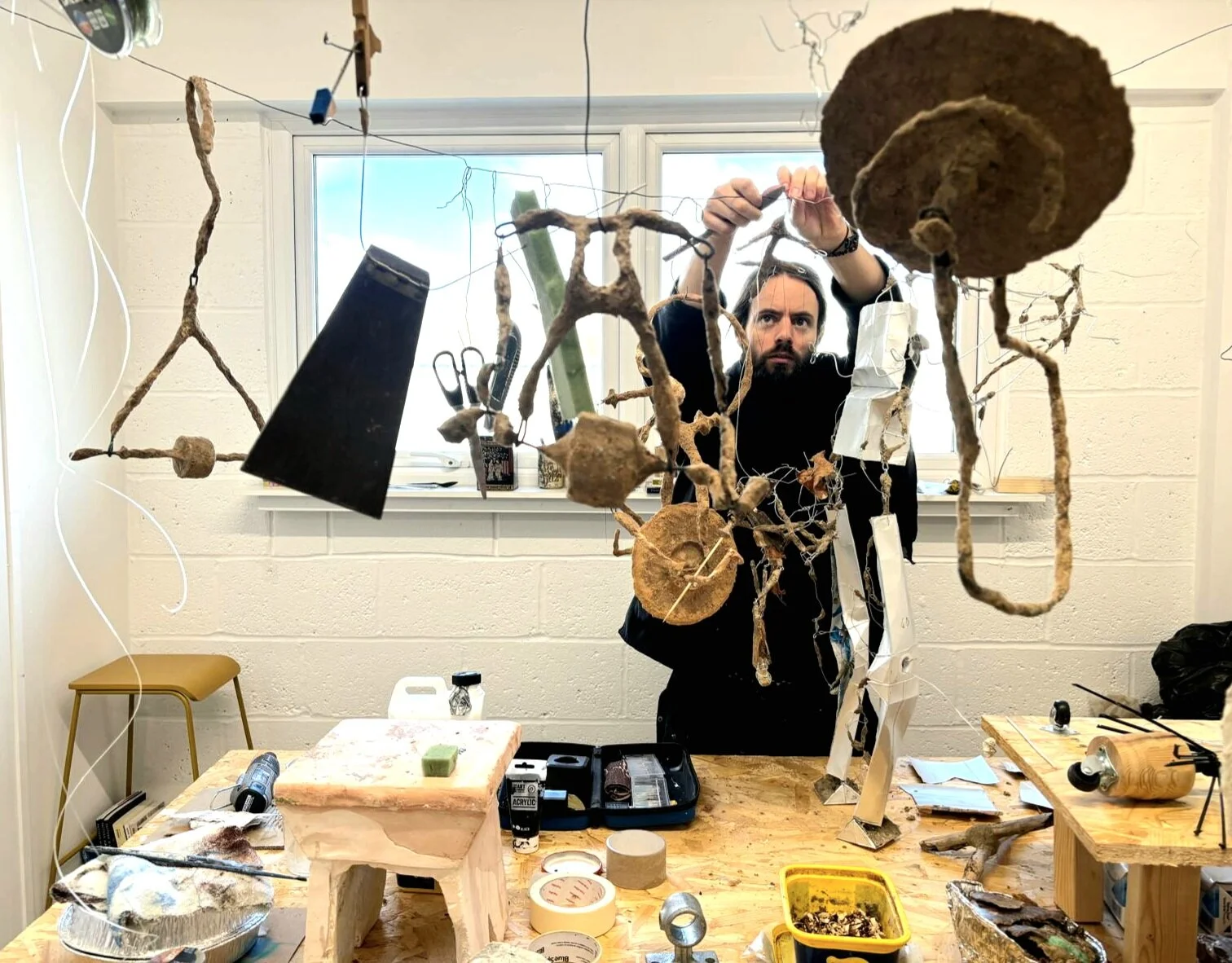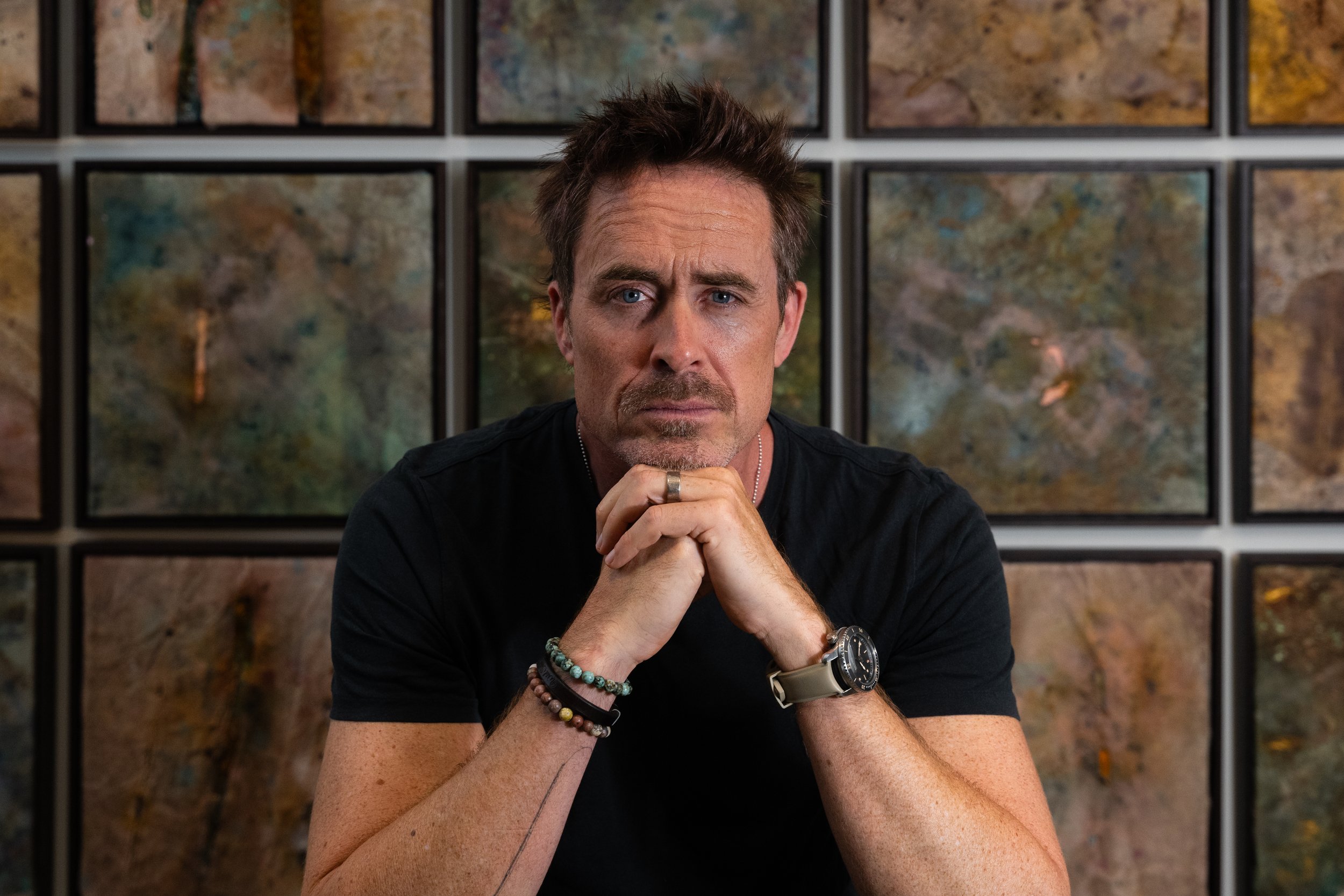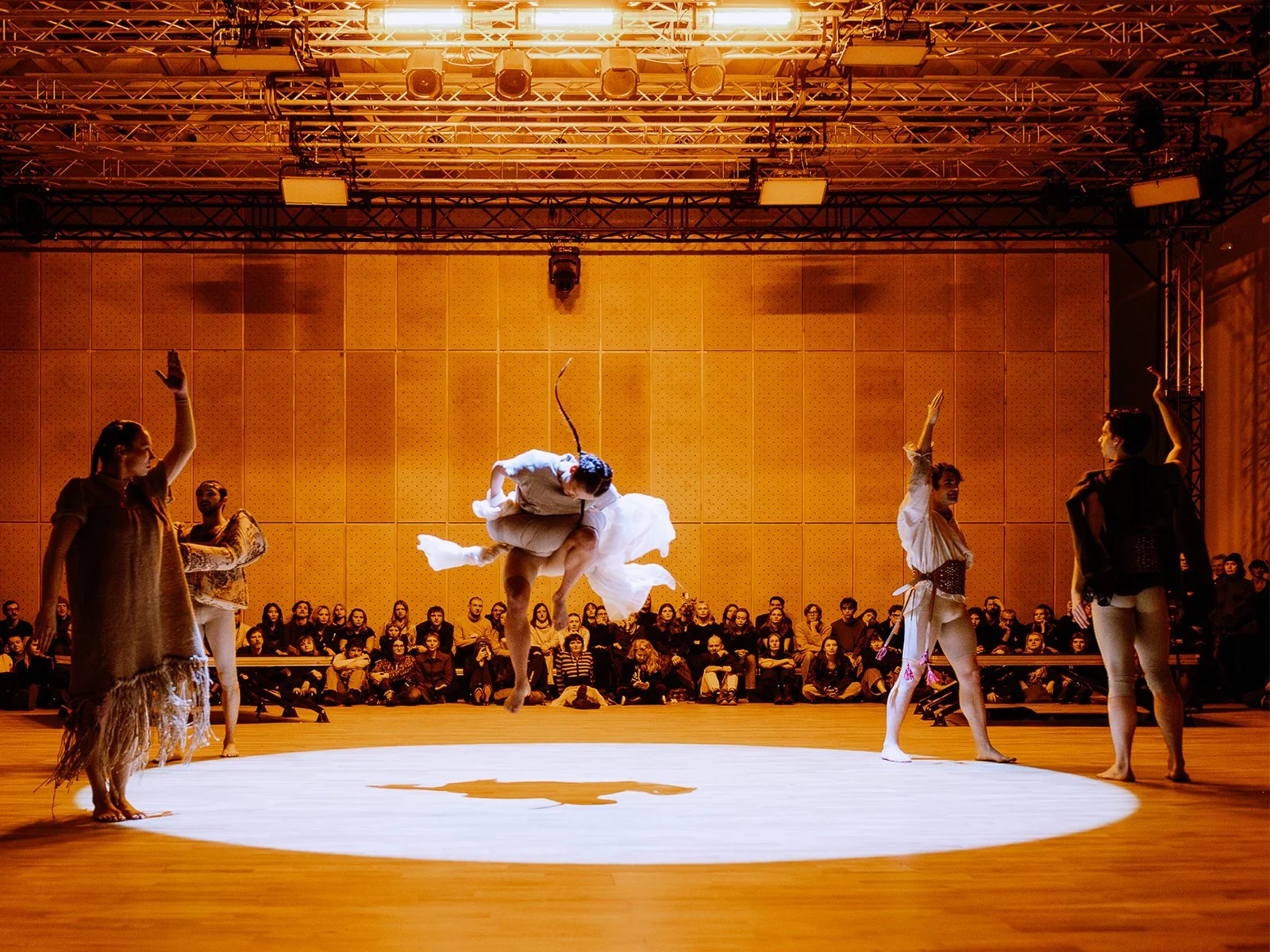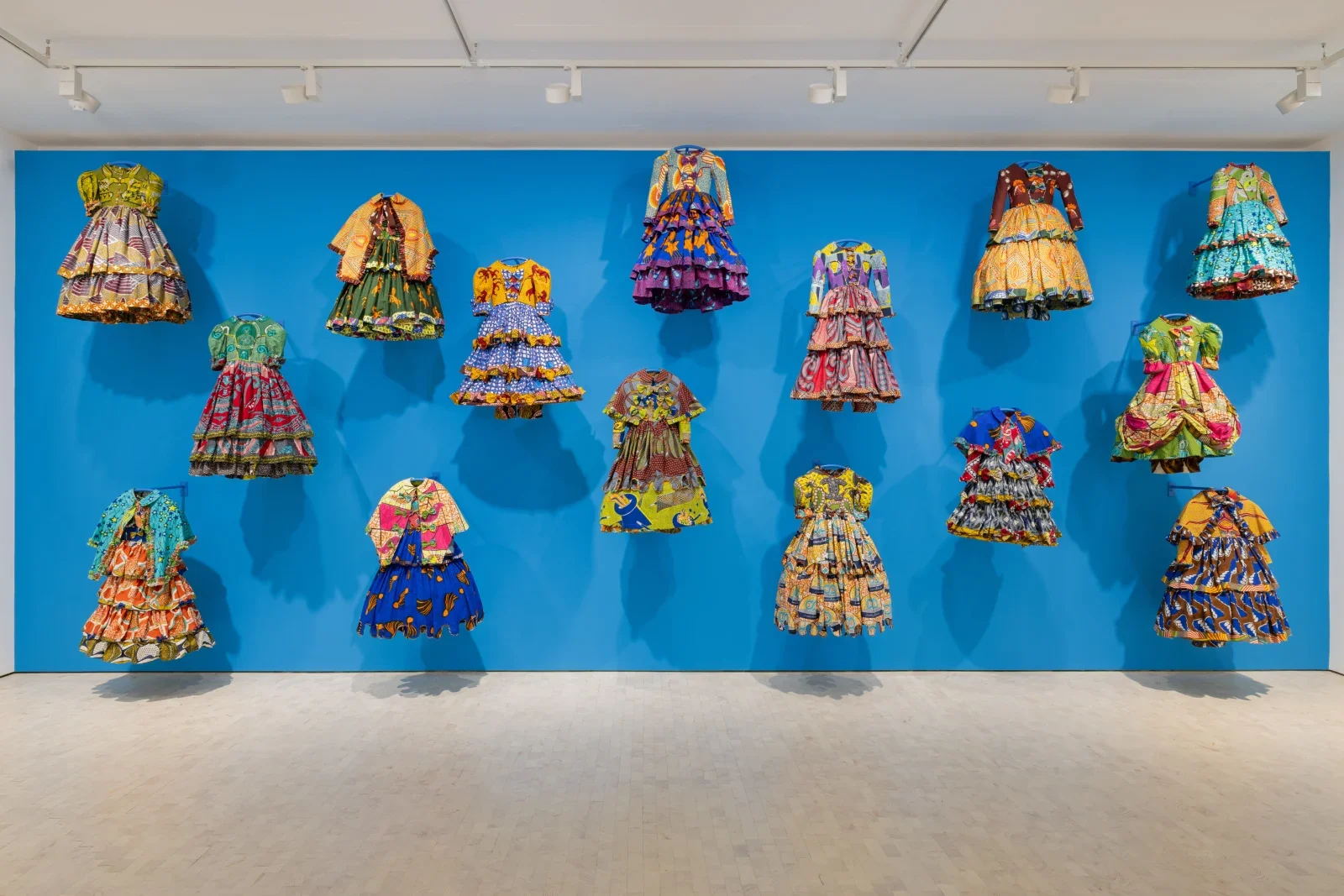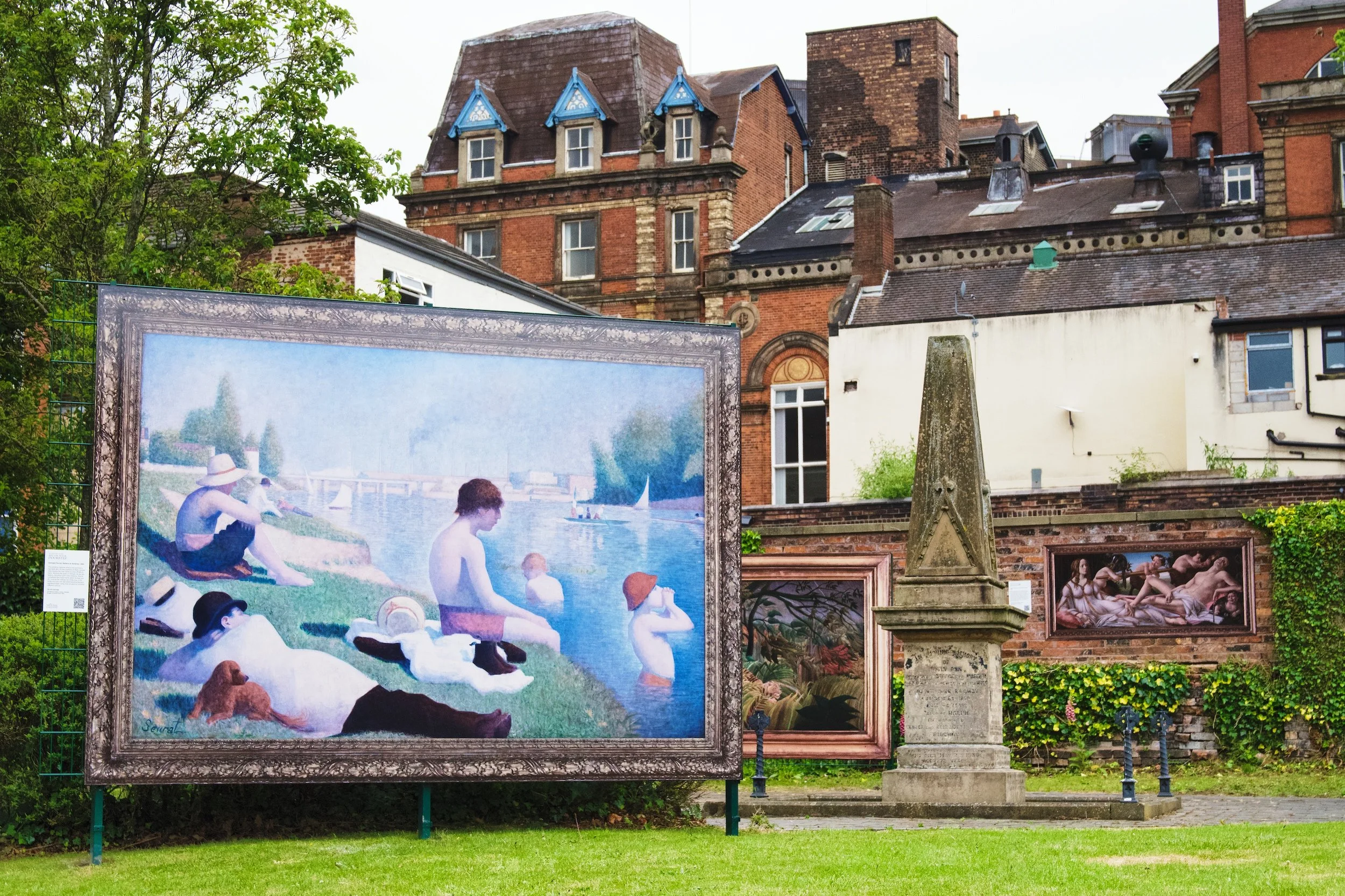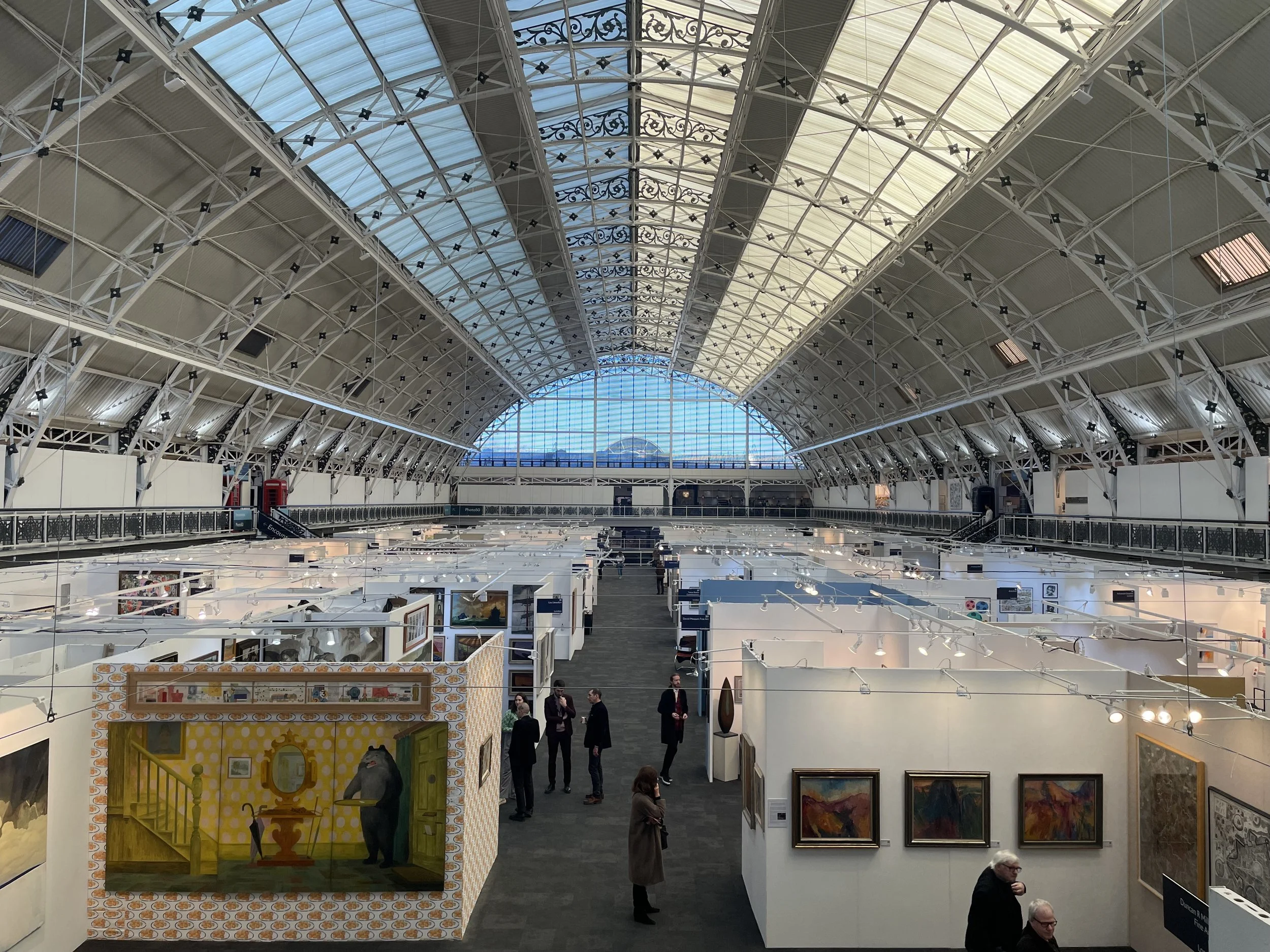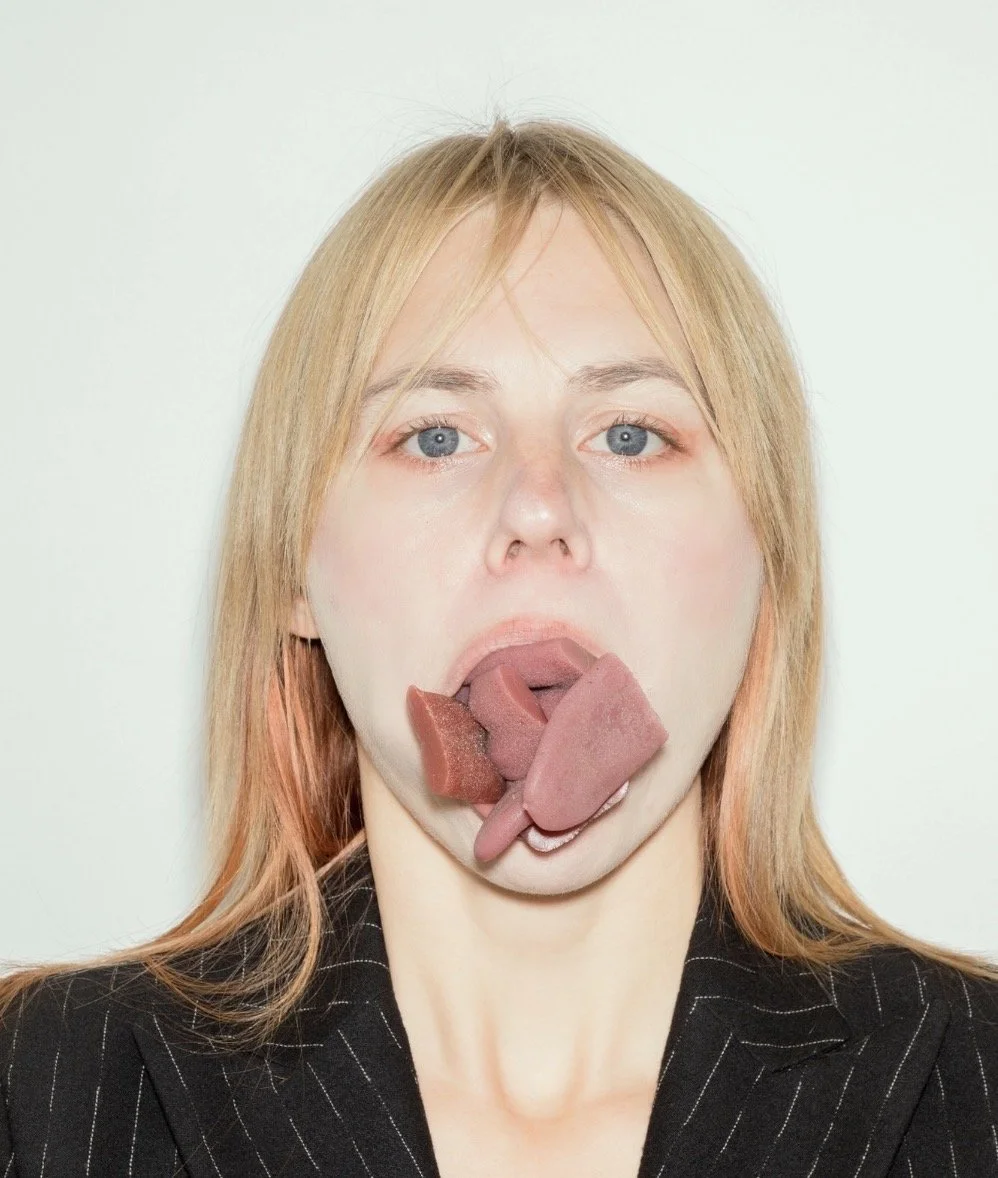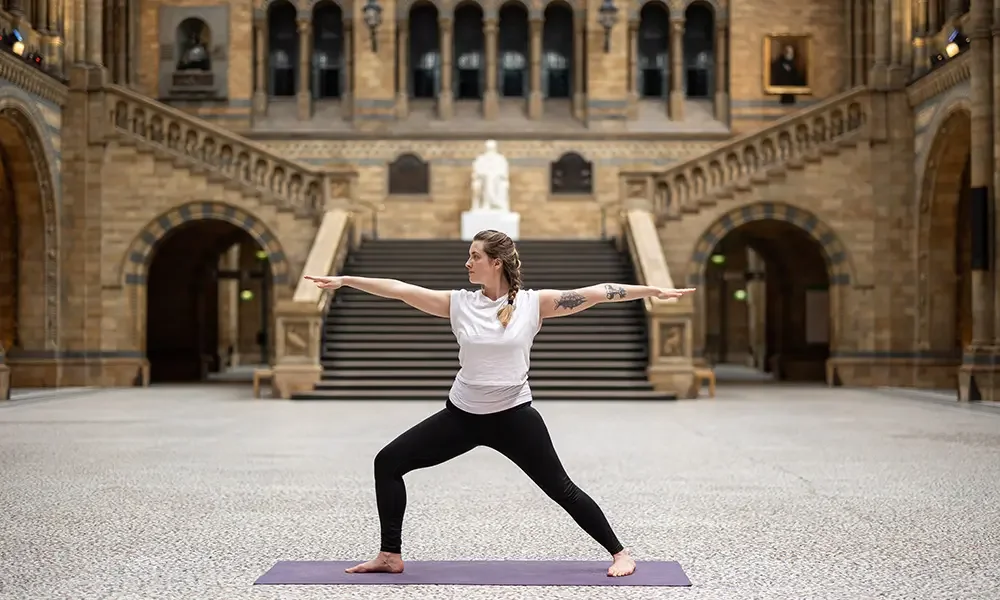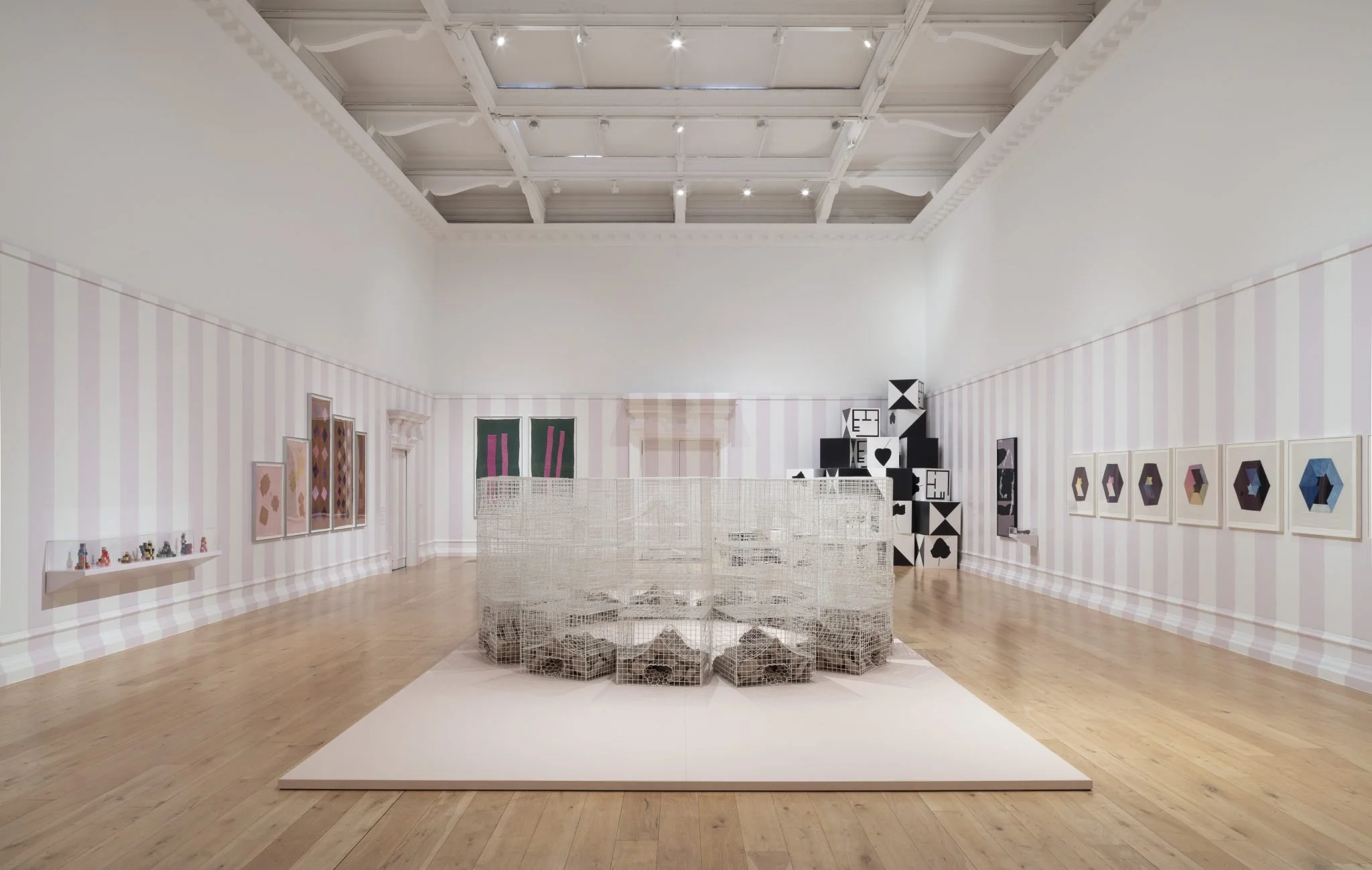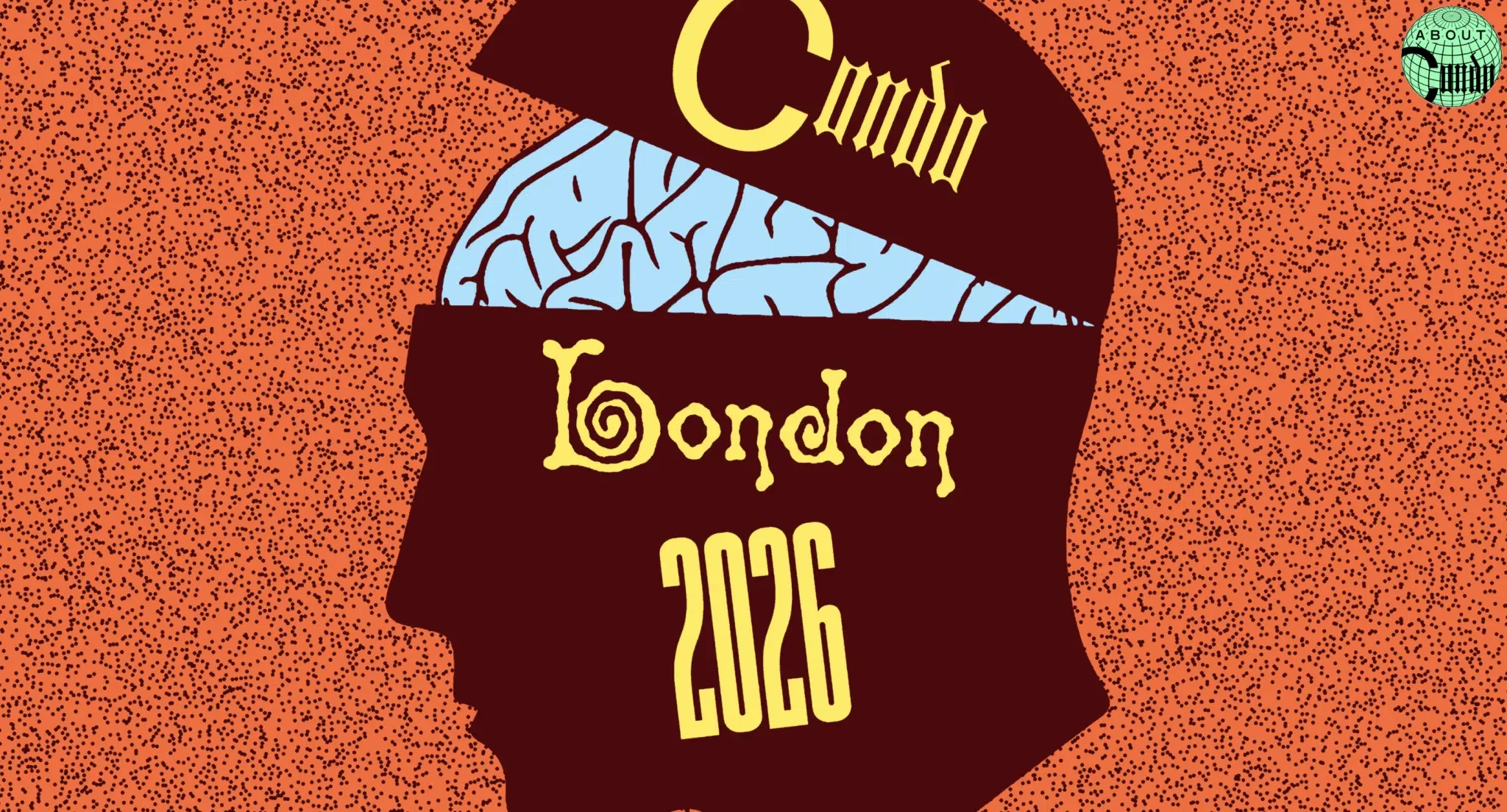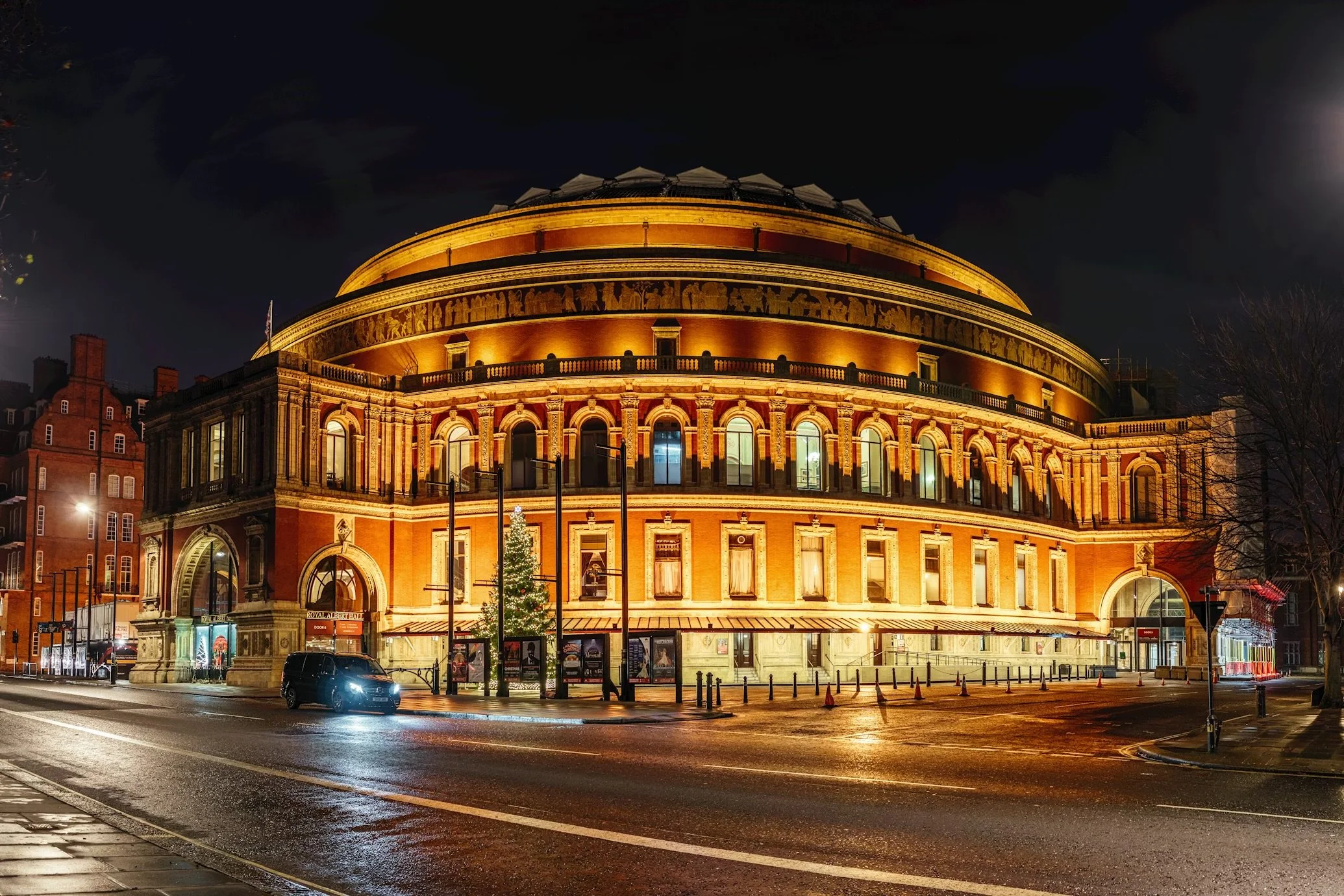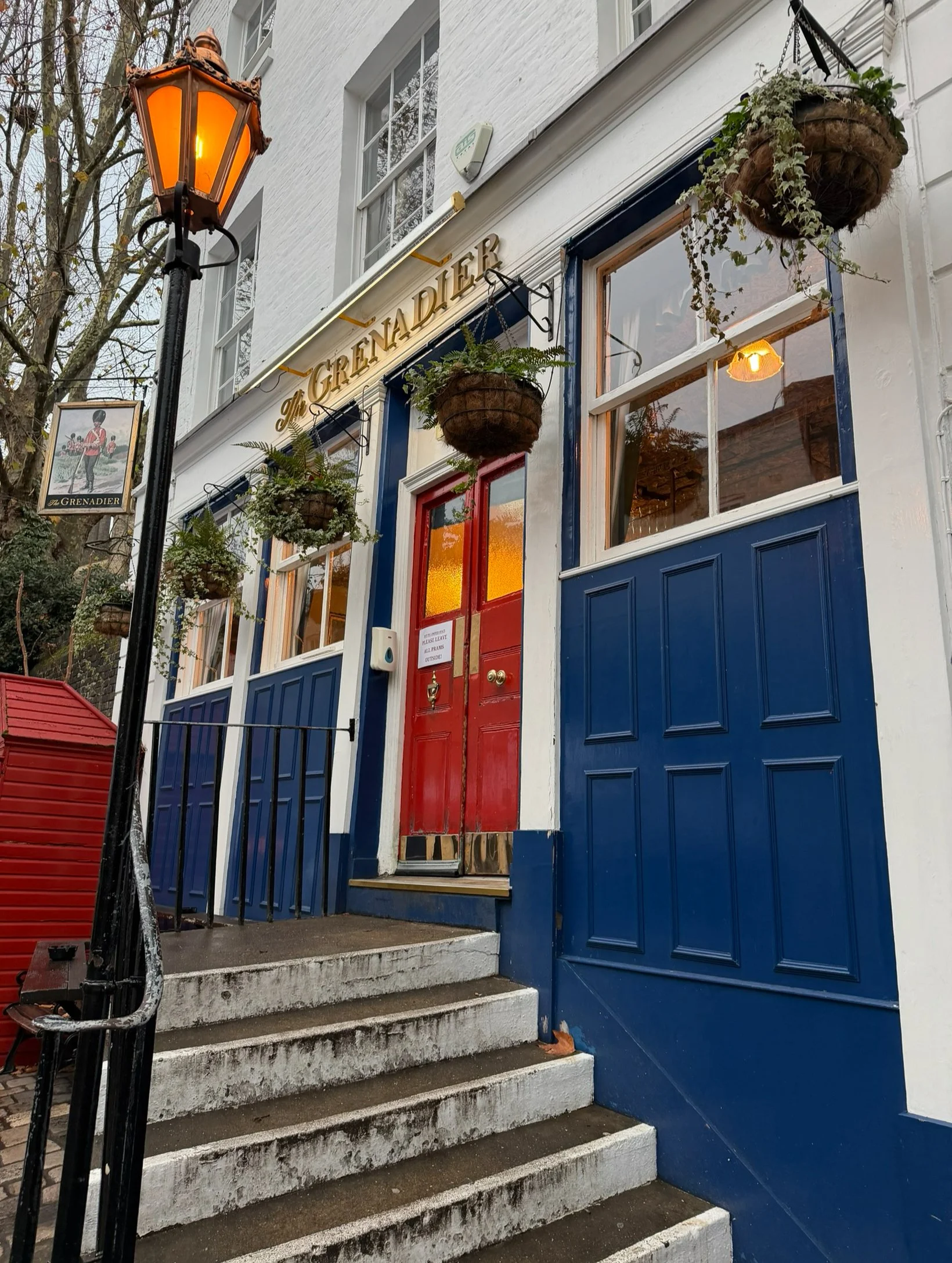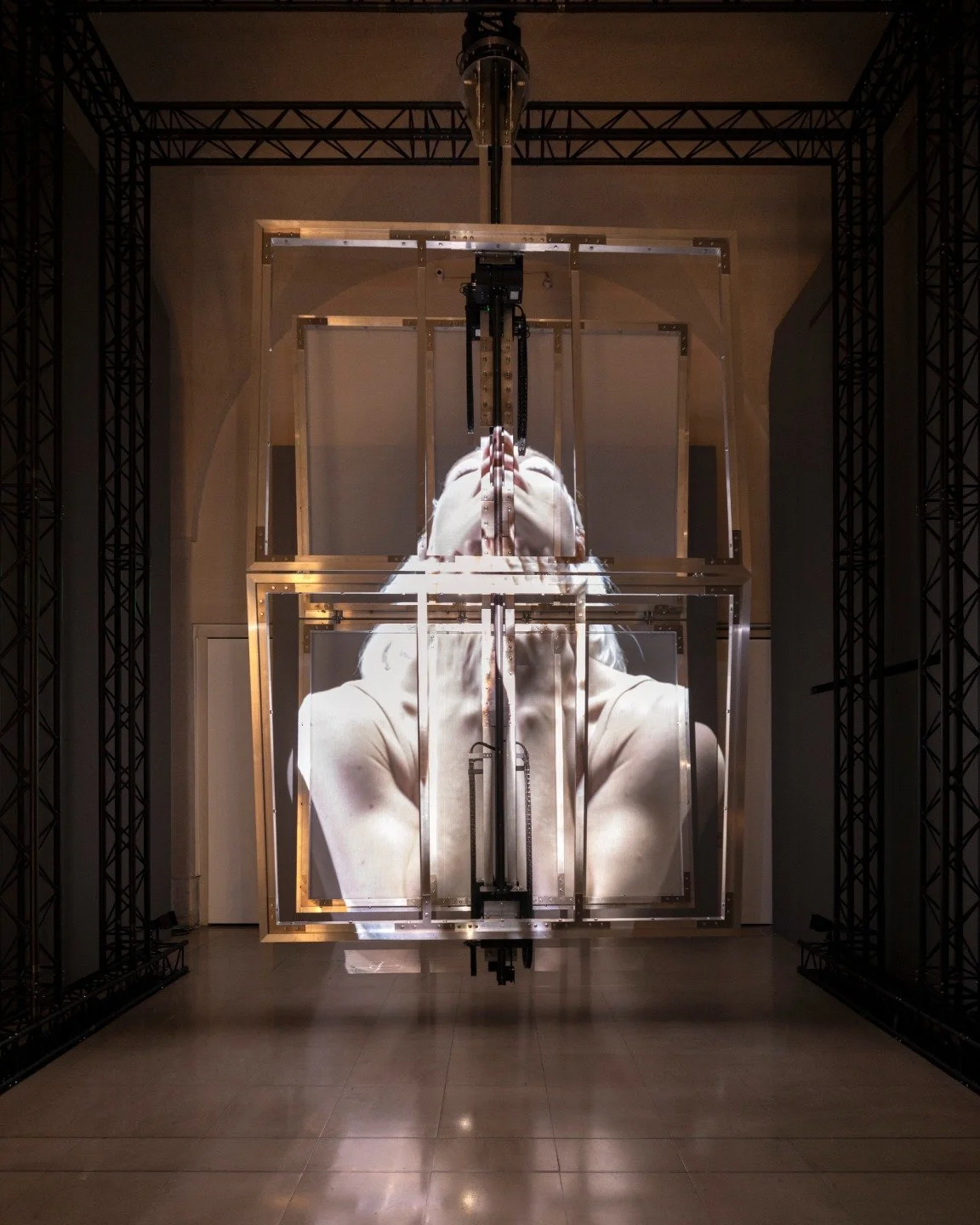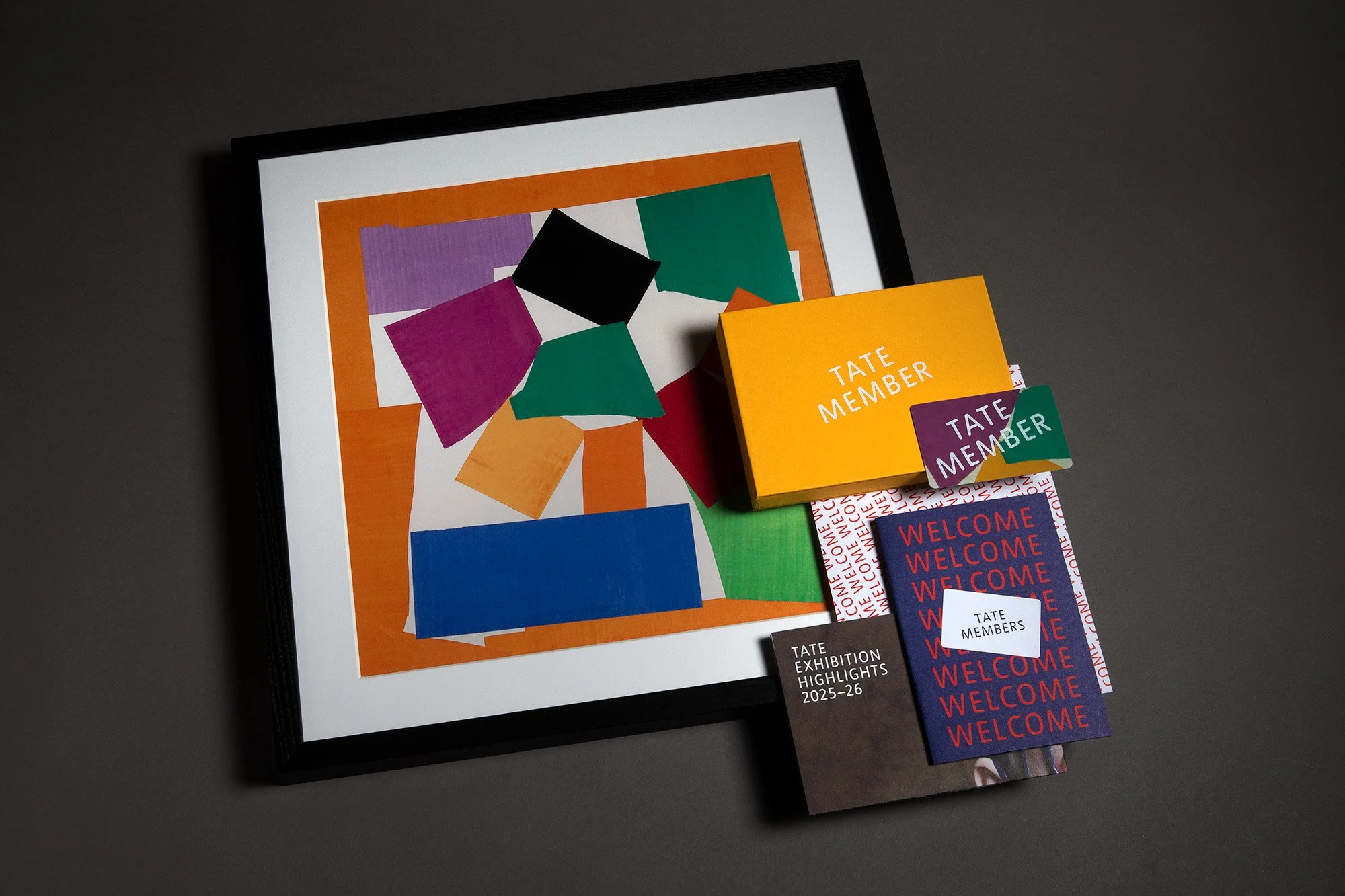In conversation with Betty Ogundipe
“LOVE/FIGHT is my first solo show, so it serves as a manifesto of what I stand for: discipline, beauty, resilience.”
- Betty Ogundipe
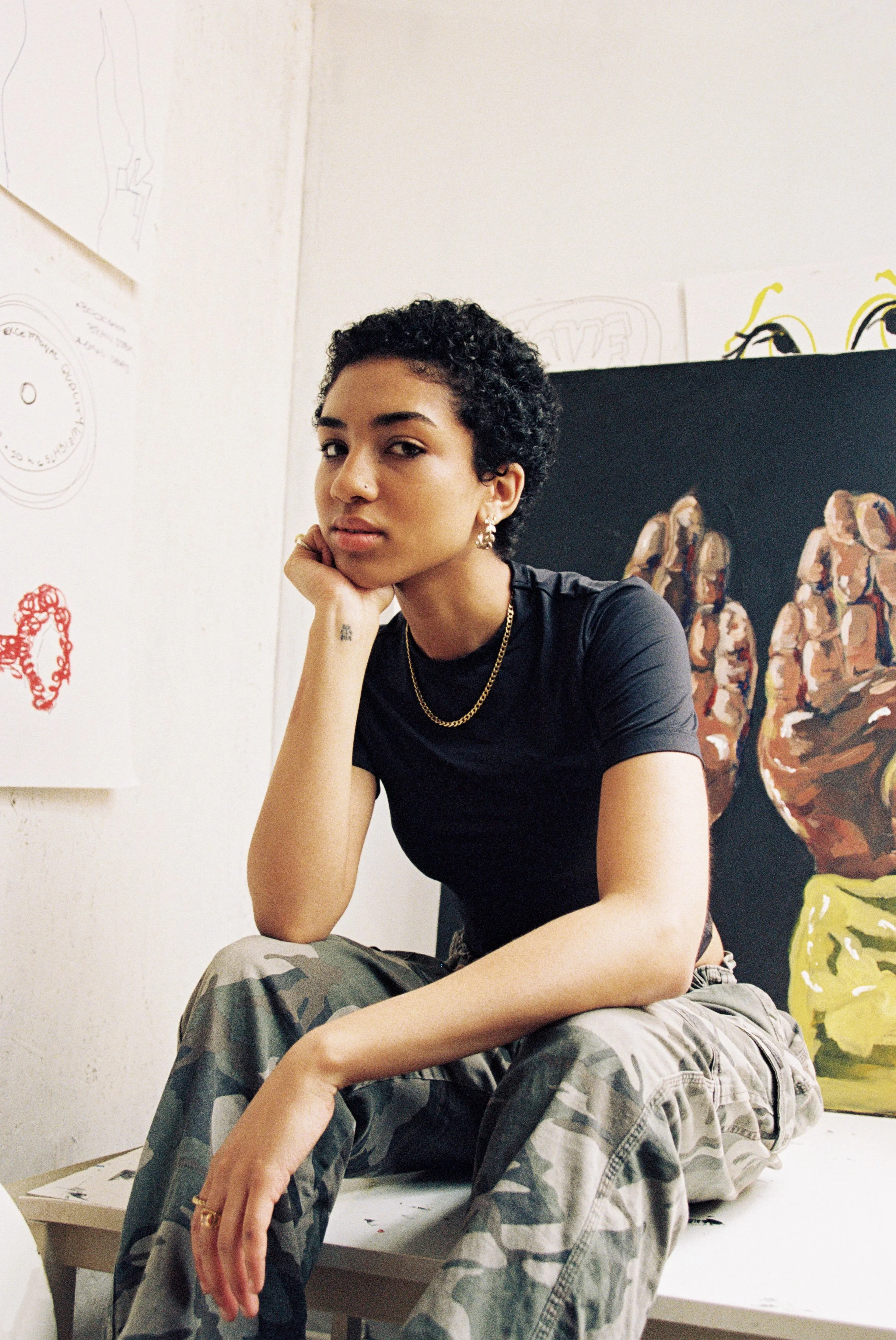
Portrait of Betty Ogundipe, Courtesy of the artist, photography Mariana Pires.
Betty Ogundipe (b. 2001) is a multidisciplinary artist of Nigerian heritage whose work explores resilience, femininity, and the power of love and resistance. Across painting, textile, photography, sculpture, and moving image, she creates symbolic narratives drawn from lived experience. Her debut solo exhibition, LOVE/FIGHT at Tache Gallery, invites viewers into reflective, multi-sensory spaces where familiar symbols are reimagined and intimacy meets strategy. Betty’s practice balances beauty, strength, and vulnerability, offering work that is both deeply personal and universally resonant.
LOVE/FIGHT is currently on display at Tache Gallery until 23 October 2025.
This is your debut solo show, LOVE/FIGHT. For those who might be encountering your work for the first time, how would you introduce yourself and your artistic journey so far?
I’d say I’m an artist working across forms to explore love, resistance, and femininity as lived experiences. My practice began with drawing and photography but has expanded to incorporate painting and textile. I see each medium as a new language. I’m from West London, and was raised in a culture where survival and creativity coexisted. I’m interested in symbols, and how they can be used as a means of communication. And in how images hold memory and power. LOVE/FIGHT is my first solo show, so it serves as a manifesto of what I stand for: discipline, beauty, resilience.
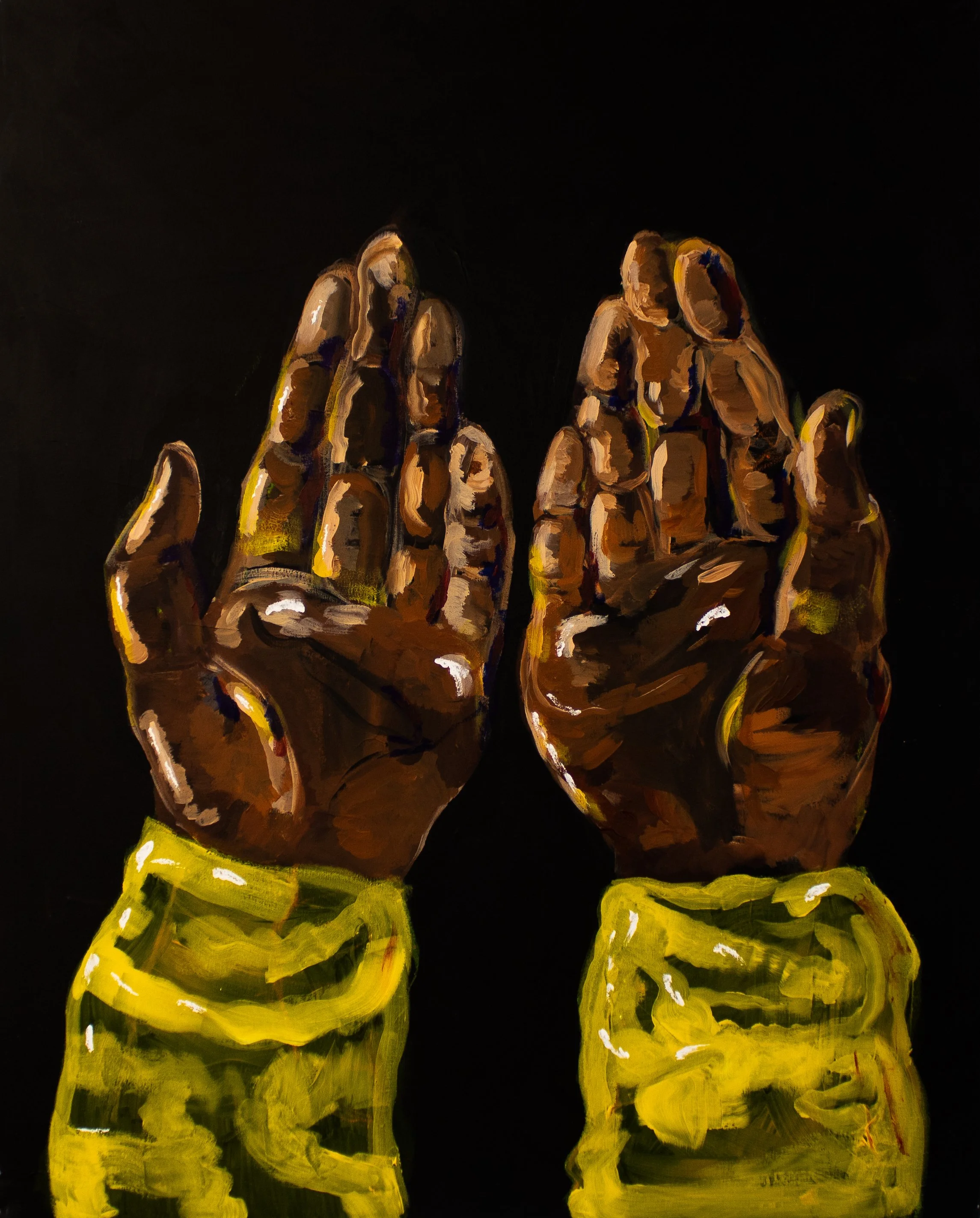
Betty Ogundipe, Pair of Hands, Prayer of Hands (2024), Copyright the artist, Courtesy of Tache Gallery.
The title LOVE/FIGHT feels both intimate and combative. What does that duality mean to you, and how does it reflect your own experience of Black womanhood?
I think giving love, and knowing you are deserving of love, takes a lot of strength. In the world of LOVE/FIGHT I am reclaiming militancy as a feminine characteristic, and the battleground as a feminine space. Discipline, resilience, and the composure to retain your beauty under pressure are the realities of womanhood. The duality of love and combat isn’t a burden; it’s a rhythm. It’s what makes survival possible, and it’s what makes joy so powerful when it finally comes.
Much of your work reclaims familiar imagery, like Cheerleader (2023), and reframes it with cultural critique. What draws you to symbols that carry such loaded expectations?
I’m drawn to symbols because they’re shortcuts into memory. The cheerleader is a symbol, defined by our expectations of her, structure, prettiness, optimism, youth, performance. But the most familiar symbols carry histories of violence and shame at the same time. By reclaiming and reframing these figures, I want to expose the mechanics of how femininity is coded, and how women are expected to perform. I want to hold images up to the light so we can question them together. In some ways, I’m less interested in inventing new symbols than in visualising the buried truths of the ones we think we understand.
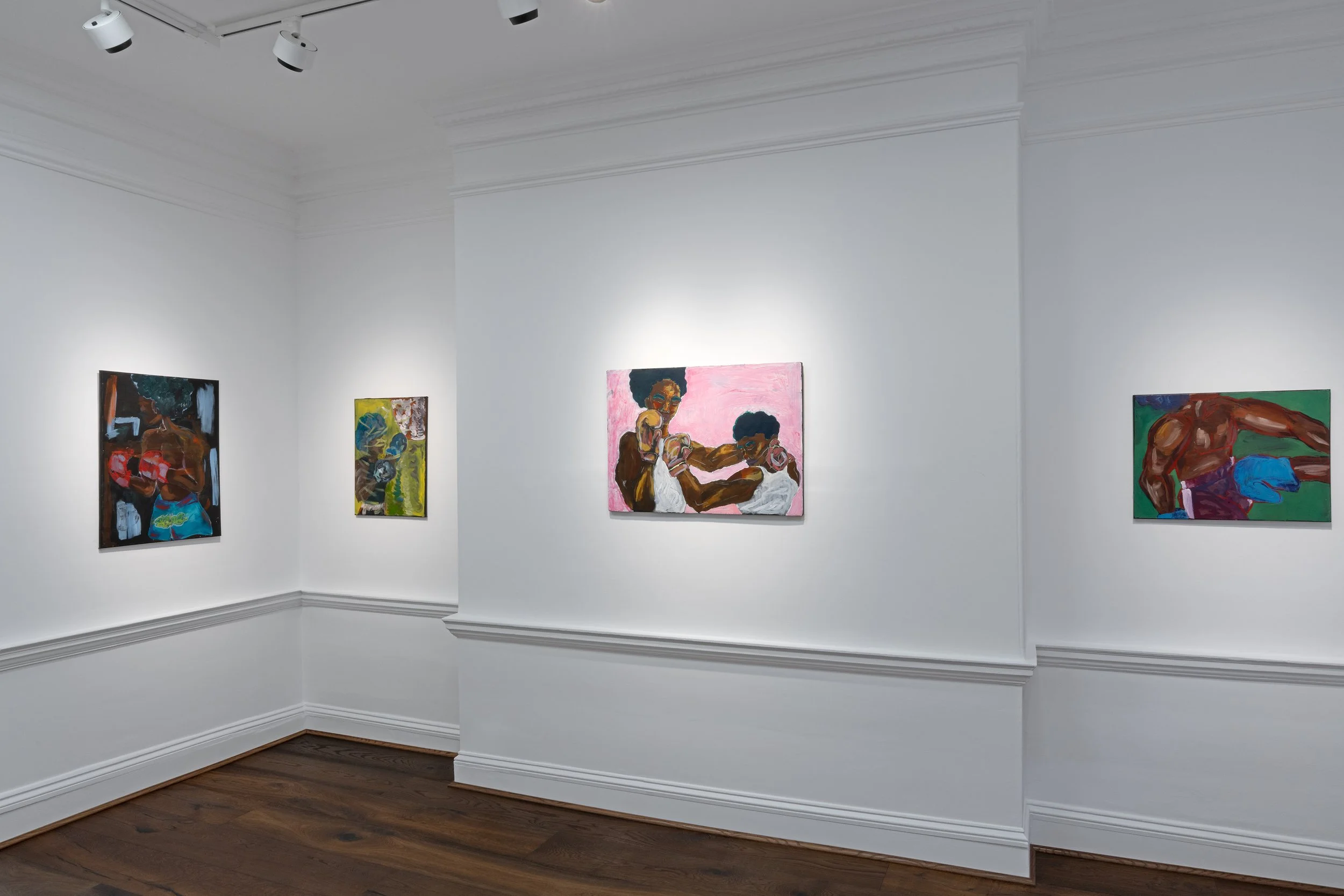
Betty Ogundipe, LOVE/FIGHT installation views by Sergey Novikov. Courtesy of Tache Gallery.
You work across many mediums from painting and textiles to photography, sculpture and film. Do you see yourself as a storyteller first, with the medium serving the story, or do the materials themselves lead the narrative?
I don’t see a hierarchy between narrative and material. Sometimes the story comes first, and I find the right form to express it with. Other times, the qualities of the material itself, the vulnerable fraying of yarn, the decisive opacity of paint, leads me to a story. I’m always attentive to tactility, to physical labour, to what it means to make something by hand.
You’ve spoken about documenting adversity as a form of empowerment. Do you see your role as an artist primarily to reflect reality, or to reimagine it?
I don’t think I can separate reflecting from reimagining. Reality is already distorted by power, so documenting it truthfully means pulling apart what we’ve been told. I see my role as showing what’s real, but also offering a vision of how it could be otherwise. Reimagination isn’t escapism, it’s survival. It’s discussion. If I only reflected back the violence, I’d be reproducing it. By reframing adversity as empowerment, I’m asserting that women, especially Black women, contain the truth of struggle and the possibility of transformation all at once.
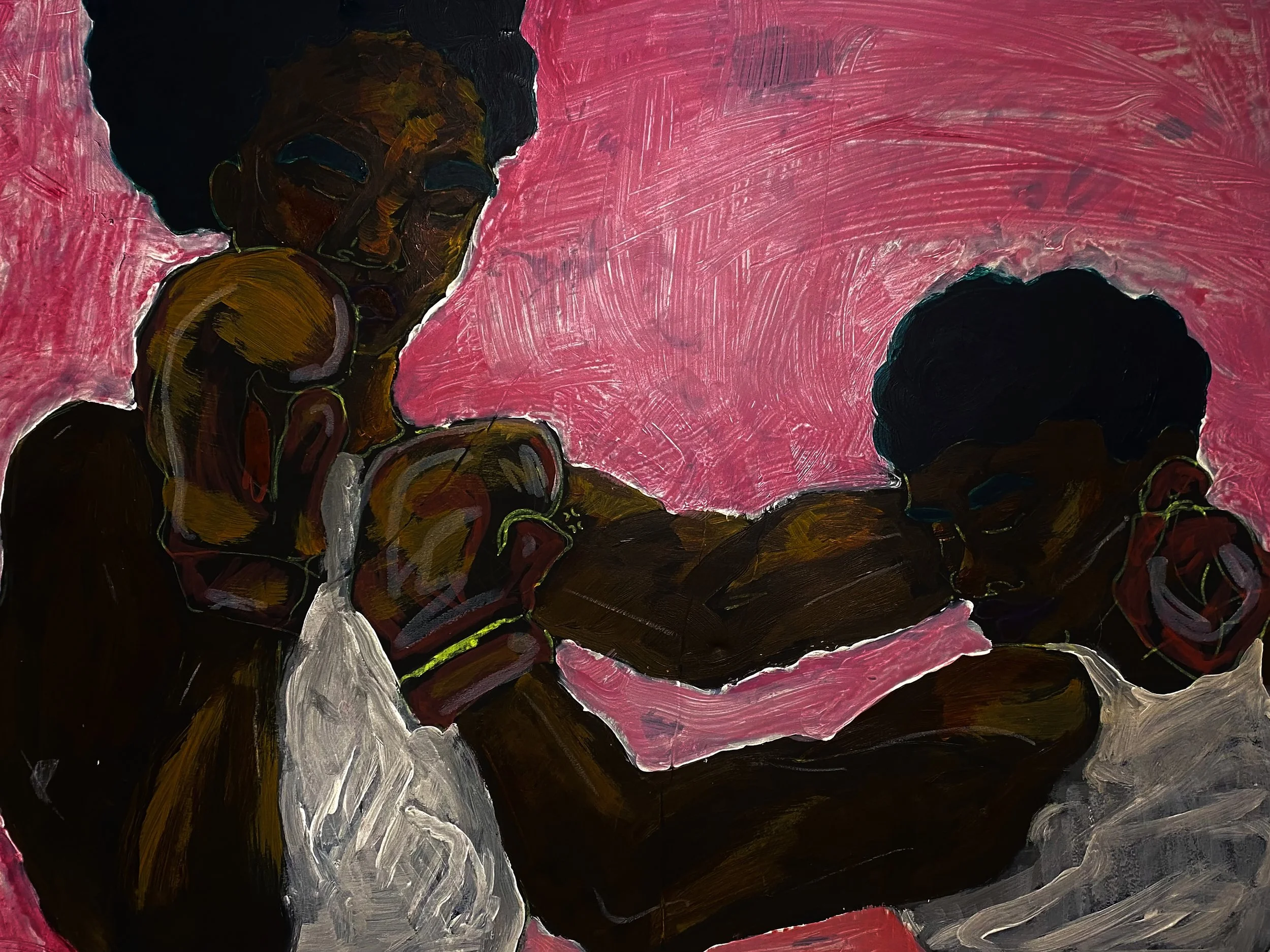
Betty Ogundipe, Untitled (2022), Copyright the artist, Courtesy of Tache Gallery.
If someone leaves LOVE/FIGHT and tells a friend about it, what’s the one thing you’d love them to say?
I’d love for someone to leave and say: “I felt seen.” Or, “I’ve never looked at this in that way before.” The details matter less than the feeling of recognition, or the feeling that something has shifted. Maybe they’ll talk about the discipline in the work, or the emotion, or the symbolism. Ultimately, I want people to leave knowing they saw truth, simplicity and honesty.
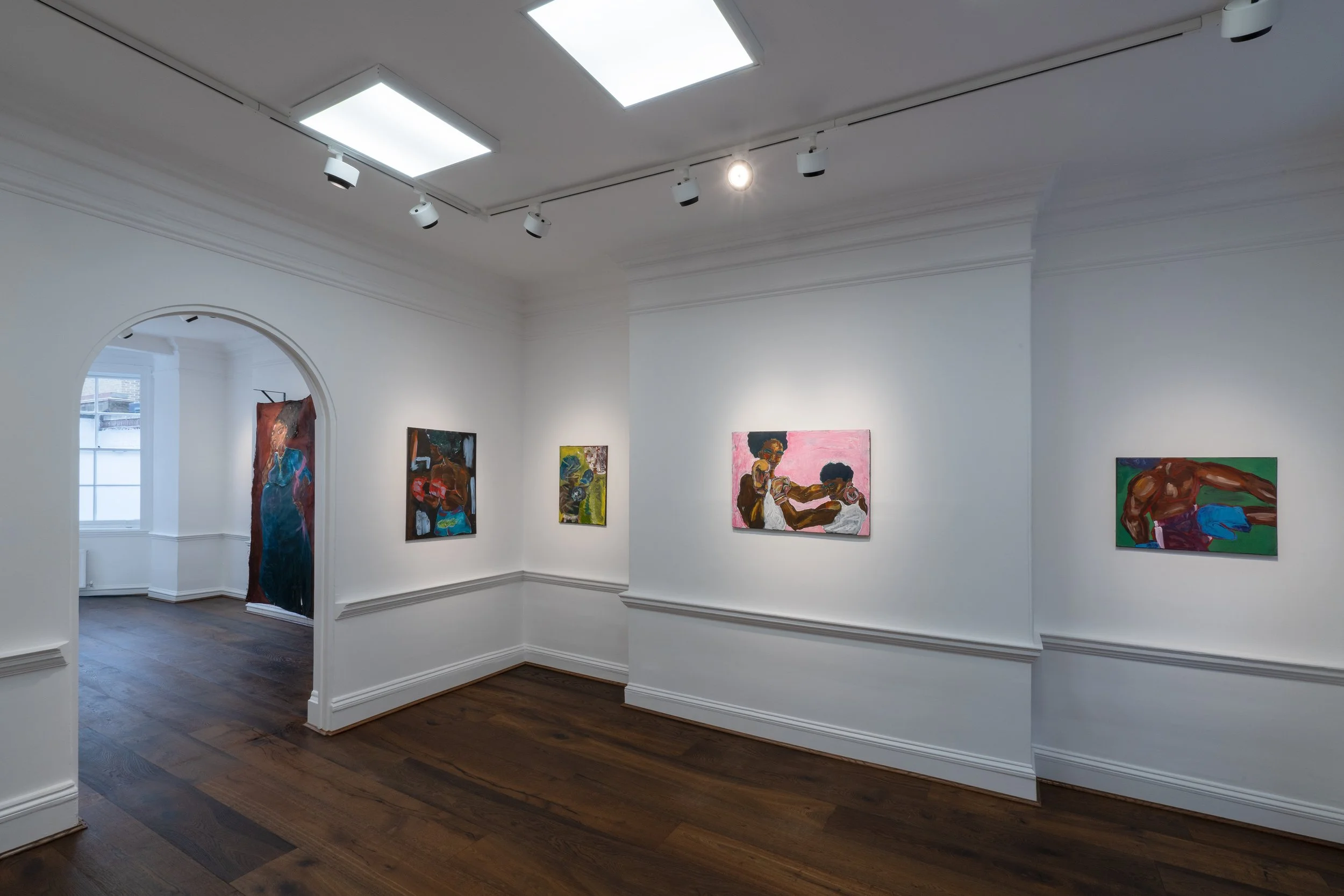
Betty Ogundipe, LOVE/FIGHT installation views by Sergey Novikov. Courtesy of Tache Gallery.
The [Quick] #FLODown:
Best life advice?
Reach for the highest, purest forms of love, health and peace you can find, and do not stop reaching until you get there, even if it means losing people along the way.
A book or text you return to for inspiration?
A Therapeutic Journey by Alain de Botton
Can’t live without?
Music, spirituality and love
Which artist, living or dead, would you most love to have a conversation with?
Faith Ringgold
What should the art world be more of and less of?
More truthful and reflective of the times we live in, less ‘freak show’ sensationalism
Website: buy-betty.com/tachegallery.com
Instagram: @buybetty/@tachegallerylondon
Ted Hodgkinson is Head of Literature & Spoken Word at Southbank Centre and oversees the seasonal literature programme as well as the annual London Literature Festival. He has judged awards including the BBC National Short Story Award and the Orwell Prize for political writing, and in 2020 he chaired the International Booker Prize…
Afra Nur Uğurlu is a visual artist and recent London College of Communication graduate whose practice bridges beauty, fashion, art, and cultural studies. In this interview, we discuss Hinterland, her zine exploring how the Turkish diaspora navigates and challenge es dominant representations…
Townsend Productions is marking the 50th anniversary of the Grunwick Strike (1976–1978) with the return of We Are the Lions, Mr Manager!, a powerful play written and musically directed by Neil Gore and directed by Louise Townsend. The production features Rukmini Sircar as Jayaben Desai. Ahead of the London run, we spoke to Neil Gore and Rukmini Sircar…
Danielle Brathwaite-Shirley lives and works between Berlin and London. Working predominantly in animation, sound, performance and video game development, and with a background in DIY print media and activism, the artist’s practice focuses on intertwining lived experience with fiction to imaginatively retell and archive the stories of Black Trans people…
Aaron Wright is a curator of contemporary performing arts, originally from the Midlands, and currently serves as Head of Performance & Dance at London’s Southbank Centre, a role he took on in 2023. Alongside his work at the Southbank Centre, he runs the queer performance club night Knickerbocker at The Yard Theatre in Hackney Wick…
Dr Lana Locke, Senior Lecturer at Camberwell College of Arts, University of the Arts London, is a multidisciplinary visual artist whose work spans sculpture, painting, drawing, video, and performance. Self-taught for over a decade before gaining postgraduate qualifications, Lana’s practice focuses on sustainability, materiality, and community engagement…
Judith Clark is a curator and fashion exhibition-maker, and currently Professor of Fashion and Museology at the University of the Arts London. She lectures on the MA Fashion Curation and is a founding Director of the Centre for Fashion Curation. From 1997 to 2002, she ran London’s first experimental fashion gallery in Notting Hill…
Lindokuhle Sobekwa is a South African photographer from Katlehong, Johannesburg. Since his first exhibition in 2013, his work on social issues and personal histories—like his photo essay Nyaope—has gained international recognition. A member of Magnum Photos, Sobekwa was recently awarded the 2025 Deutsche Börse Photography Foundation Prize for his project I carry Her Photo with Me…
Sol Bailey Barker is a multidisciplinary artist whose work explores the connections between ecology, mythology, and speculative futures. Through sculpture, sound, and installations, they blend ancient knowledge with emerging technologies to examine humanity’s relationship with the natural world…
Hanna Salomonsson is a London based Swedish ceramic artist. Following a career in landscape architecture, she re-trained in ceramics in 2018. She also holds a BA in Art History, and this combined with her landscape grounding provides a unique vantage point for her ceramic practice…
Lewis Walker is a London-born queer, non-binary movement artist. A former Great Britain gymnast and Acrobatic Gymnastics World Champion, they trained from age 6 to 21 before earning a degree in Contemporary Dance. Their work spans theatre, film, fashion, music, and the commercial sector. Walker continues to choreograph gymnastics competition routines for the Great Britain, Italian and French national teams…
Daniel is a curator-producer dedicated to the social impact of the arts and cross-sector collaboration. He is currently Creative Director & Chief Executive of Old Diorama Arts Centre (ODAC) in Euston, where he has strengthened the centre’s community connections amidst urban transformation…
Peter Bellerby is the founder of Bellerby & Co. Globemakers, a company renowned for its exquisite hand-crafted globes. Established in 2010, the company specialises in meticulously designed pieces that showcase exceptional craftsmanship, positioning Bellerby & Co. as a leader in the globe-making industry…
Gabriele Beveridge is known for her sculptural and conceptual practice that combines materials as diverse as hand-blown glass, photo chemicals, and found images…
Robyn Orlin is a South African dancer and choreographer born in Johannesburg. Nicknamed in South Africa "a permanent irritation", she is well known for reflecting the difficult and complex realities in her country. Robyn integrates different media into her work (text, video, plastic arts) to she investigates a certain theatrical reality which has enabled her to find her unique choreographic vocabulary…
Katrina Palmer, an artist known for exploring materiality, absence, and dislocation, recently spoke to us following her year-long residency at the National Gallery about her exhibition The Touch Report…
Enej Gala is an artist who splits his time primarily between London and his hometown of Nova Gorica, Slovenia. A graduate of the Academy of Fine Arts in Venice and the Royal Academy Schools (2023), Gala first gained our attention with Neighbour’s Harvest, an installation that cleverly combined puppetry and conceptual art…
David Ottone is a Founding Member of Award-winning Spanish theatre company Yllana and has been the Artistic Director of the company since 1991. David has created and directed many theatrical productions which have been seen by more than two million spectators across 44 countries…
Darren Appiagyei is a London-based woodturner whose practice embraces the intrinsic beauty of wood, including its knots, cracks, bark, and grain. Highly inspired by Ghanaian wood carving, Darren explores raw textures and new woods in his work…
Huimin Zhang is an artist specialising in 22K gold, known for her innovative craftsmanship. She combines various cultural techniques, including filigree, engraving, and European gold and silver thread embroidery, to create unique works…
Akinola Davies Jr. is a BAFTA-nominated British-Nigerian filmmaker, artist, and storyteller whose work explores identity, community, and cultural heritage. Straddling both West Africa and the UK, his films examine the impact of colonial history while championing indigenous narratives. As part of the global diaspora, he seeks to highlight the often overlooked stories of Black life across these two worlds.
Hannah Drakeford is a London-based interior designer known for her bold and colourful interiors. She transitioned from a 21-year retail design career to interior design, and has gained popularity on social media where she now shares creative upcycling tutorials and encourages individuality in home decor…
Shula Carter is an East London-based creative with a background in contemporary, ballet, and modern dance. She trained at the Vestry School of Dance and later at LMA London, where she developed skills in commercial, hip hop, and tap dance, alongside stage and screen performance…
Dian Joy is a British-Nigerian interdisciplinary artist whose work delves into the intersections of identity, digital culture, and the fluid boundaries between truth and fiction. Her practice is rooted in examining how narratives evolve and shape perceptions, particularly in the digital age.
Dian Joy is a British-Nigerian interdisciplinary artist whose work delves into the intersections of identity, digital culture, and the fluid boundaries between truth and fiction. Her practice is rooted in examining how narratives evolve and shape perceptions, particularly in the digital age.
John-Paul Pryor is a prominent figure in London’s creative scene, known for his work as an arts writer, creative director, editor, and songwriter for the acclaimed art-rock band The Sirens of Titan…
Jim Murray is an actor, director, conservationist and artist known for Masters of Air (2024) and The Crown (2016). Murray first came to prominence as an artist in 2023 with his acclaimed inaugural exhibition In Flow, where his dynamic abstract paintings were hung in conversation with John Constable’s The Dark Sid…
Anthony Daley is an abstract expressionist painter known for his vibrant, large-scale works that explore beauty through intense colour and light. His art bridges the past and present, drawing inspiration from the Old Masters as well as diverse sources like literature, science, poetry, and nature.
Rachel Kneebone’s work explores the relationship between the body and states of being such as movement, stasis, and renewal. Through her porcelain sculptures, she examines transformation and metamorphosis, reflecting on what it means to inhabit the body and be alive…
Saff Williams is the Curatorial Director at Brookfield Properties, bringing over fifteen years of experience in the arts sector…

With Six Nations 2026 starting on 5 February, London is packed with pubs, bars and restaurants showing every match…
Somerset House Studios returns with Assembly 2026, a three-day festival of experimental sound, music, and performance from 26–28 March. The event features UK premieres, live experiments, and immersive installations by artists including Jasleen Kaur, Laurel Halo & Hanne Lippard, felicita, Onyeka Igwe, Ellen Arkbro, Hannan Jones & Samir Kennedy, and DeForrest Brown, Jr…
This week brings fresh details from some of the UK’s most anticipated exhibitions and events, from Tate Modern’s Ana Mendieta retrospective and David Hockney’s presentation at Serpentine North to the British Museum’s acquisition of a £35 million Tudor pendant…
This week in London (2–8 Feb 2026) enjoy Classical Mixtape at Southbank, Arcadia at The Old Vic, Kew’s Orchid Festival, Dracula at Noël Coward Theatre, free Art After Dark, Chadwick Boseman’s Deep Azure, the Taylor Wessing Portrait Prize, and Michael Clark’s Satie Studs at the Serpentine…
SACHI has launched a limited-edition Matcha Tasting Menu in partnership with ceremonial-grade matcha specialists SAYURI, and we went along to try it…
Croydon is set to make history as the first London borough to host The National Gallery: Art On Your Doorstep, a major free outdoor exhibition bringing life-sized reproductions of world-famous paintings into public spaces…
February in London sets the tone for the year ahead, with landmark exhibitions, major theatre openings, late-night club culture and seasonal festivals taking over the city. From Kew’s 30th Orchid Festival to Tracey Emin at Tate Modern and rooftop walks at Alexandra Palace, here’s what not to miss in February 2026…
Tate Modern has announced that Tarek Atoui will create the next Hyundai Commission for the Turbine Hall. The artist and composer is known for works that explore sound as a physical and spatial experience…
Kicking off the London art calendar, LAF’s 38th edition at Islington showcased a mix of experimental newcomers and established favourites. Here are ten standout artists from London Art Fair 2026…
Discover a guide to some of the artist talks, as well as curator- and architecture-led discussions, to be on your radar in London in early 2026…
This week in London, not-to-miss events include the T.S. Eliot Prize Shortlist Readings, the final performances of David Eldridge’s End, the return of Condo London, new exhibitions, classical concerts, a film release, creative workshops, wellness sessions, and a standout food opening in Covent Garden with Dim Sum Library…
Plant-based cooking gets the Le Cordon Bleu treatment in a new series of London short courses…
January is your final opportunity to catch some of London’s most exciting and talked-about exhibitions of 2025. Spanning fashion, photography, contemporary sculpture and multimedia, a diverse range of shows are drawing to a close across the city…
As the new year begins, London’s cultural calendar quickly gathers momentum, offering a packed programme of exhibitions, festivals, performances and seasonal experiences throughout January. Here is our guide to things you can do in London in January 2026…
Condo London returns in January 2026 as a city‑wide, collaborative art programme unfolding across 50 galleries in 23 venues throughout the capital, from West London and Soho to South and East London. This initiative rethinks how contemporary art is shown and shared, inviting London galleries to host international…
The Southbank Centre has announced Classical Mixtape: A Live Takeover, a one-night-only, multi-venue event taking place in February 2026, bringing together more than 200 musicians from six orchestras across its riverside site…
This week in London features late-night Christmas shopping on Columbia Road, festive wreath-making workshops, live Brazilian jazz, mince pie cruises, theatre performances, art exhibitions, a Christmas disco, and volunteering opportunities with The Salvation Army.
Discover London’s unmissable 2026 fashion exhibitions, from over 200 pieces of the late Queen’s wardrobe at The King’s Gallery to the V&A’s showcase of Elsa Schiaparelli’s avant-garde designs and artistic collaborations…
Marking her largest UK project to date, Sedira’s work will respond to the unique architectural and historical context of the iconic Duveen Galleries, offering audiences an experience that merges the political, poetic, and personal…
This week in London, enjoy festive events including Carols at the Royal Albert Hall, LSO concerts, designer charity pop-ups, late-night shopping, art exhibitions, film screenings, foodie experiences, last-chance shows, and volunteer opportunities across the city…
Explore Belgravia this Christmas with a festive pub crawl through London’s most charming historic pubs, from The Grenadier’s cosy mews hideaway to The Nags Head’s quirky classic tavern…
From the joys of Christmas at Kew to the lively Smithfield meat auction, and from major concerts and ballets to intimate workshops and family-friendly trails, the city offers an extraordinary mix of experiences. This guide brings together the very best of Christmas in London…
This guide highlights some of the must-see art exhibitions to visit over the festive period in London, including the days between Christmas and New Year’s. From major retrospectives of international masters such as Kerry James Marshall, Wayne Thiebaud, and Anna Ancher, to engaging contemporary works by Danielle Brathwaite-Shirley, Jennie Baptiste, and Tanoa Sasraku…
London’s cultural scene, a gallery or museum membership is the perfect alternative to another pair of socks. From unlimited access to exhibitions and exclusive events to discounts in shops and cafés, these memberships offer experiences that can be enjoyed throughout the year, while also supporting the vital work of arts organisations…
Your guide to London’s can’t-miss events this week, 17–23 November 2025, from Cabaret Voltaire live at ICA to Ballet Shoes at the National Theatre and The Evolution of UK Jazz at the Barbican…
Charlotte Winifred Guérard is a London-based artist and recent graduate of the Royal Academy of Arts School, where she was recognised as a Paul Smith’s Foundation scholar for her artistic achievement. Her work has been exhibited at the Royal Academy, Coleman Project Space, Fitzrovia Gallery, Messums and Palmer Gallery, and she has completed prestigious residencies including…
This week in London, you can enjoy festive ice skating, Christmas lights, jazz and classical concerts, and a range of art exhibitions. Highlights include Skate at Somerset House, Christmas at Kew, the EFG Jazz Festival, and the Taylor Wessing Photo Portrait Prize 2025…


